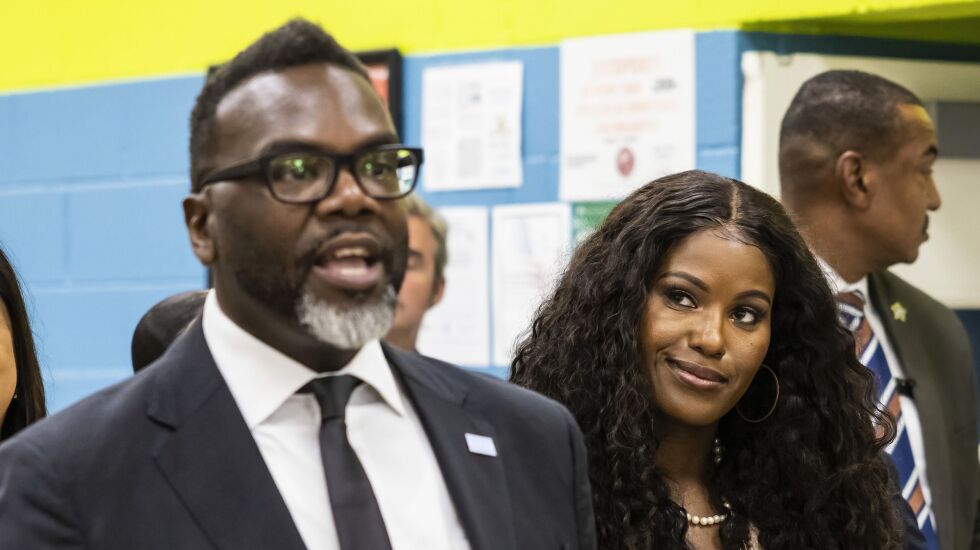
As a former teacher, former Chicago Teachers Union organizer and the first Chicago mayor in recent history with children in the city’s public schools, Mayor Brandon Johnson is uniquely positioned to understand the nexus between family, community and education. His history offered hope that he would be attuned to the voices of families too often sidelined in education policy discussions.
Yet despite his background and campaign pledges to “stand for the people,” Johnson is failing to fulfill his promise. Mere months into his first term, both he and his hand-picked Chicago Board of Education have made a series of decisions that have increasingly distanced families from crucial education conversations.
CPS families want to know: When will Brandon Johnson stand up for them?
Concern first surfaced with Johnson’s appointments to the board. After promising “a process that allows for real community input” to appoint board members, Johnson provided no public engagement process whatsoever before making his selections.
Confronted by the media regarding the lack of family involvement with his decisions, his administration’s response was as paternalistic as it was dismissive: “We haven’t asked because we already know.”
The administration’s refusal to engage families in any public process bred distrust and was a far cry from the inclusive governance Johnson promised during his campaign.
Just five months into their tenure, members of the board unilaterally decided to “transition away” from Chicago’s system of choice. The resolution to do so was released just days before the meeting and approved with minimal public input, further raising families’ concerns.
While rooted in noble intentions to address systemic inequities, this determination lacked the transparency and community involvement required for decisions with such massive implications for families’ school options.
Dramatic changes in education strategies, especially those proposing to radically reconfigure the educational landscape, demand robust debate and input from those they impact most. How can we address educational stratification and inequity effectively if decisions are made in isolation? Doing so risks exacerbating the very inequities the board aims to address.
Put employees before families
The structure of board meetings further exemplifies this growing disconnect, as they continue to marginalize the very people the board should prioritize: students and parents. The voices of union and principals’ association officials now dominate these meetings, owing to their seemingly unrestricted access — and time — to address the board.
Meanwhile, parents and students are forced to navigate a restrictive sign-up process and often fruitless attempts to be heard. The privileging and centering of CPS employees over CPS families is not only inequitable but also undermines the principles of representative governance.
As Johnson faces the daunting challenges of negotiating a new collective bargaining agreement with the CTU, addressing looming budget deficits and guiding the city’s transition to an elected school board, his actions in the coming months will be critical.
The decisions made today will shape the educational landscape of Chicago for years to come. Addressing these challenges requires not just administrative acumen but a profound commitment to the principles of equity and community involvement.
Families still have hope Johnson will align his actions with the promises that fueled his ascent to the mayor’s office. He has an opportunity to recommit to listening to and centering families, to enact genuinely inclusive processes that authentically engage the diverse voices of Chicago and to provide the leadership our city’s educational landscape desperately needs. He has the insight, experience and, importantly, mandate to co-create an education system reflective of and responsive to the needs and aspirations of all Chicagoans.
Given the challenges and opportunities facing Chicago, the time is ripe for Johnson to be the education advocate he vowed to be — a mayor who listens, engages and acts only after hearing from families.
We look forward to seeing the real Brandon Johnson stand up — as a champion for Chicago’s families and their rightful place in shaping the city’s education future.
Daniel Anello is CEO and Hal Woods is chief of policy at Kids First Chicago, an education nonprofit.
The Sun-Times welcomes letters to the editor and op-eds. See our guidelines.
The views and opinions expressed by contributors are their own and do not necessarily reflect those of the Chicago Sun-Times or any of its affiliates.







